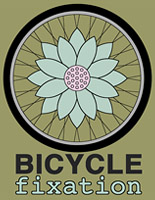For Orange 20 Bikes, I wrote in both Celebration and Complaint, after looking over a new, small neighborhood shopping cluster that almost gets it right.
And on Flying Pigeon LA's blog, I review the effects of even modest implementations of bicycle infrastructure on cycling's mode share in cities all over the US...look at And Heeere's...the Bicycle Millennium!—and be sure to follow all the links.
Richard Risemberg on Tue, 29 May 2012 17:07:12 -0800 [link]
The light merino knit T-shirts have been cut, and sewing commences in the coming week. Expect to see them on the website soon! We've been wearing one nearly every day for months to test it out, and believe me, it hurt to give it back to the factory for a few days as a sewing guide to get the stitching started! Fortunately we've got it back now....
The City Knicker v2.0 are now out of stock, but we are hoping to replace them with a v3.0 sometime in late summer if we can work it out. The new design will be a little closer fitting and have our Deep Hem at the cuff instead of the drawstring; this means that tall folks can have them let out for a few bucks at any tailor's or dry cleaner's shop. They'll also be a little more elegant. Plus, we've seen samples for some sweet hemp blend herringbone that we hope to use for part of the run. (Part will be in wool, of course.)
And...we're working on a pattern for an update of the classic racing cap, to be released in wool and Japanese broken denim, with a few changes to make it both more functional and more elegant. All coming soon, we hope.
There is also another house brand project for Clever Cycles in the works...so keep an eye on this blog, if you don't ride naked.
Or take a look at our Classic Wool Knickers, Knicker Socks, James Black Hats, and other goodies in stock right now...click here.
Richard Risemberg on Sun, 27 May 2012 08:11:13 -0800 [link]
At Orange 20, I cover the difference in how Los Angeles and santa Monica are developing their stations on the new Expo Line light rail spur to the west, at One Train Line, Two Party Lines.
And for Flying Pigeon LA, I muse on Why It Should Be Raining Sharrows.
And don't forget to add your comments to each blog.
Richard Risemberg on Wed, 23 May 2012 17:26:54 -0800 [link]
Of course the paper version, even in this digital age, is the easiest of all to read, and the most visually impressive--David Niddrie is one fine photo editor! Very well laid out, too. Find a shop that carries the paper version here, or subscribe, if you're impressed enough with what you see online, here.
Los Angeles is not so bad to ride in as folks often think, and I like to flatter myself that my article shows its good side...or just a few of its many good sides.
Richard Risemberg on Tue, 22 May 2012 07:15:55 -0800 [link]
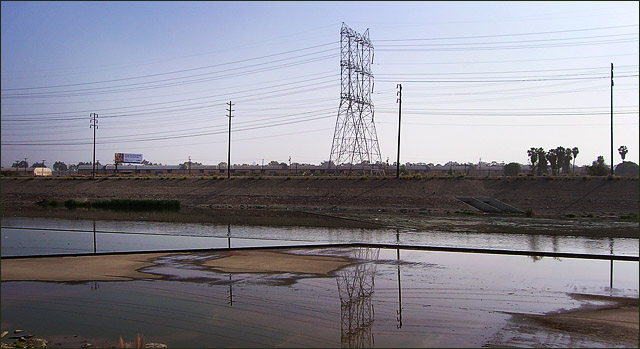
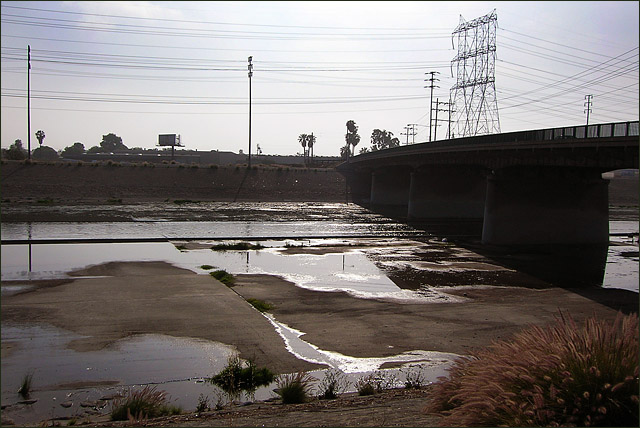
The rest of the ride was pleasant if uneventful, and after a detour around a parade in Long Beach itself I arrived at the ride HQ in plenty of time for juice and pastries, and good fellowship. Grip and grin all around, and off we went, cruising along road bridges over the numerous marinas and inlets of the area, watching happy people relaxing on the sand or on boats or at sidewalk tables, dodging around the beach cruisers and basket bikes, till we got to the happy chaos of the Huntington beach pier.
What a festive, crowded scene it made! Bright colors, music, and easy smiles all around. Unfortunately, ride boss Matty never stays at the pier longer than necessary for a bathroom stop, so I'll have to go back there on my own some day for a lazy lunch and an hour or two of photography, but there was lunch and more fellowship waiting back at HQ, and on we rode.
The day waned as we ate, so, with a century in mind, I left around half past two, anticipating the usual headwind along Anaheim Street, a veritable monument to bleakness cutting across behind the two harbors, bordered by shrieking, smoking refineries, truck yards, and railroad tracks. Those tracks more or less support the US economy, and Anaheim rears up in steep, broad humps to carry its seven lanes over them several times. With the wind in my face and seventy miles already behind me, I felt the climbs! Especially as I was of course riding my fixed-gear.
But a short while after the last of those, I was at Redondo Beach, which I ride to so often that it feels like home turf to me anymore. From there to the Bicycle Bridge at Playa del Rey is an easy cruise along the sand, and from the Bridge a creekside bike path takes me almost all the way home.
Where Gina had a "restorative dinner" waiting for me--home-made spinach and garlic soup, home-baked bread, and fresh strawberries.
And I slept well.
Richard Risemberg on Mon, 21 May 2012 09:54:52 -0800 [link]
I learned today that Willie Middlebrook, one of my fellows in photography from decades ago, has died. Willie and I were not close, but we knew each other; he went to a couple of my exhibits, I went to a couple of his, and he frequented the photo shops where I worked at various times in sales and web design, and in giving seminars on advanced techniques in darkroom work. I commuted to those jobs by bike, but that had nothing to do with Willie. He was a big man in every sense of the word--big in spirit, big in passions and angers, and physically big; he weighed between 350 and 450 pounds for most of the time I knew him. Much of his work was big too--he specialized in heavily manipulated photo murals, most centered on themes of the Black experience in America--he was a Black man. I don't know how long his website will remain available, but while it remains, you can see some of his images here. He died of a stroke, so I suppose the weight killed him, though in some ways it also defined him and helped him structure his work.
He was deeply involved in political and community issues as well, which also structured and informed his work. Though his life was often tumultuous--at least when I knew him--he was not only respected but much loved in the various communities that knew him--the photo and art worlds, the Black community, even the city administration. He had received several grants from Los Angeles and other governmental and non-proft entities, not just because he was a powerful artist but also because his art explored the meaning and function of community--and often, of course, its failures. One of his last commissions was the artwork at the Crenshaw station of the newly-open Expo Line light rail branch to the Westside.
Tomorrow I'll be riding to Long Beach to join the Far West Milano Cycle Club in a birthday ride honoring Ted Ernst, one of the old guard of the Southern California bike scene. He will be eighty years old--and will be along for the ride. Ted owned a bike shop but was also involved in political and community issues, and became a defining force in the evolution of our local cycling culture. Here's an article about him published last year. I've never met him face to face, so I'm looking forward to seeing him on tomorrow's ride. But I can't forget for now that I won't be seeing Willie face to face anymore, and that he could have done much more had he lived on.
I plan to ride by the Crenshaw Expo Line station tomorrow to see one of Willie's last artworks on my way to Long Beach.
Willie was fifty-four.
Richard Risemberg on Sat, 19 May 2012 19:41:10 -0800 [link]
At Orange 20, I wonder whether Santa Monica Mayor Richard Bloom's run for State Assembly might bode well for biking in California...we've got to wonder, Will Cycling Bloom with Bloom in Sacramento?
And Flying Pigeon LA gets a paean to Northeast Los Angeles, Cycling, and "family values" of a more real sort than the phrase usually implies in Fathers, Sons, and Fixies.
Enjoy!
Richard Risemberg on Wed, 16 May 2012 11:42:24 -0800 [link]
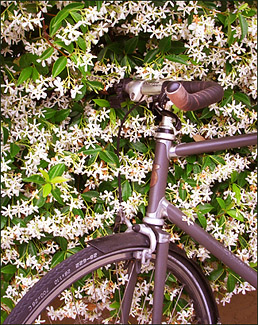 There is something primitive yet sophisticated in the odor of jasmine in full bloom, filling the lungs with a sensation of vivid cleanness, sparking the nerves with its sweetness. Combine it with the rhythm of cycling, and you have about as powerful a pleasure as you can indulge in in public view....
There is something primitive yet sophisticated in the odor of jasmine in full bloom, filling the lungs with a sensation of vivid cleanness, sparking the nerves with its sweetness. Combine it with the rhythm of cycling, and you have about as powerful a pleasure as you can indulge in in public view....Los Angeles is redolent with jasmine now; it's a popular shrub, easy to grow, pretty, and with a perfume so fundamental that it's indescribable; instead, you use it to describe less-primal things that also make you feel this good. As I ride through the city, every few blocks I merge with an invisible delight as the perfume drifts on the wind from gardens, flowerpots, and those narrow planted borders so common alongside office buildings, so that even the busy main streets are graced by this perfume. The motorists, ensonced in their hermetic armor, plugged in to canned and structured entertainments, miss it all. But walkers and cyclists can fill their lungs, and hearts, at will. There is little finer about springtime in our city.
Out on the bike, breathing deeply, every molecule of scented air a gift...only a blue sky over the blue Pacific can exceed it. And we ride through jasmine on our journeys to the sea....
Richard Risemberg on Sat, 12 May 2012 09:26:00 -0800 [link]
Richard Risemberg on Wed, 09 May 2012 11:43:19 -0800 [link]
But Metro still doesn't quite get that "multi-modal" doesn't mean building giant parking lots at stations and neglecting all the more efficient modes of travel.
The picture below is a good illustration:
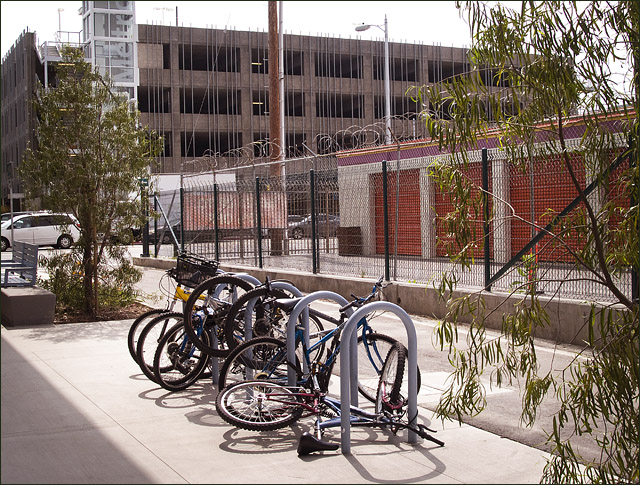
Looming behind it, across the street, is a prime exampole of Stalinist architecture housing 476 parking spaces for cars. Parking spaces that at current rates would have cost between $30,000 and $70,000...each.
They will be free to motorists. That's right, we won't charge drivers a cent to park there. Of course, someone pays...that someone being all the residents of the county, through property tax, and all the residents and visitors of the county, through the Measure R sales tax increment. To encourage people to drive to a light rail station.
That space could have been housing, commerce, a school or library, a community square, what have you...instead, it will just store cars.... What a waste!
Why don't we just buy their gas for them too? Maybe buy them bigger cars while we're at it, so they can clog up our expensive roads all the more effectively.
Sure, someone paid for the bike rack too--I'll bet it cost close to $800 to buy and install. Of course it takes up less space than one of those car slots in the structure, and brings the Expo Line twelve riders instead of one or two.
Couldn't we have taken the idea of enticing people to switch to more effective transport modes more seriously and built a tiny parking structure for cars, an equally tiny (but effectively more capacious) parking structure for bikes, and used the rest of the money that giant blockhouse cost to hire more bus drivers and buy more buses, bringing people to the station from the neighborhood in wholesale lots rather than dribs and dabs?
Cars generally operate three-quarters empty; buses generally operate three-quarters full. So one bus replaces thirty three cars on average.
That's a lot less wear on streets, and a lot less need for expensive lane-miles--lane-miles that double dip, because not only do they cost to build and maintain, but they take land out of use so it generates no property or sales taxes for the city and county.
And bikes, of course--they require only about a tenth the space for travel lanes or parking, per passenger, that cars do. And it would take centuries for heavy bike traffic to wear out a road.
Why do we keep lavishing money on the least efficient mode of transport even at our light rail stations?
LA, you got some 'splainin' to do....
Richard Risemberg on Sat, 05 May 2012 14:02:43 -0800 [link]
Then on flying Pigeon LA's blog, I muse on the York Boulevard bridge, and how to accommodate both cyclists and motorists at rush hour. Read A Bridge Not Far Enough--and let us know your thoughts in the comments there.
Richard Risemberg on Wed, 02 May 2012 12:57:54 -0800 [link]
Settle down and read Episode 2: Dazed and Confused.
I don't think this took place in Garrison Keillor's Minnesota....
Richard Risemberg on Tue, 01 May 2012 21:30:39 -0800 [link]
It's not on their web site yet, and in any case, their print layouts are always outstanding, and far superior to the online versions. Since the guide is chock-full of photographs, it's worth popping down to your local bike shop or newsstand to see whether there's a copy handy.
Lots of other excellent articles too, all covering the pleasures and problems of urban cycling, mostly focussed on the US and Canada.
Richard Risemberg on Tue, 01 May 2012 16:23:23 -0800 [link]
